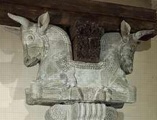
Examples of capitals:

Susa (Iran-Iraq border), Acheminide epoch,
reign of Darius I (c. 510 BCE),
Capital of a Column of the Audience Chamber (Apadana)
in the Palace of Darius I, limestone,
height 3.20 m, Louvre. See Mesopotamian art.
A schematic diagram of the Doric order and a diagram of the Ionic order.
North Africa (Tunisia, Byzacena, Roman, c. 300 CE), Dedicatory Inscription (in Latin), marble, 17 1/2 x 32 inches (44.5 x 81.3 cm), Michael C. Carlos Museum, Emory U, Atlanta, GA. See inscription.

France, Toulouse, capital of a column at St. Sernin, c. 1080-1120.
See aerial view, apse,
axonometric projection,
chapel, crossing,
cruciform, nave,
plan, and Romanesque.
Psalmodi, Corinthian style capital with its impost block from a late Romanesque cloister, as revealed at the Psalmodi excavation site. See cloister, column, impost block, marble, and Romanesque.

Byzantine (Constantinople), late 13th - early
14th century, Capital with Bust of the Archangel Michael,
marble, 25.4
x 17.1 x 10.6 cm (10 x 6 3/4 x 4 1/8 inches), Metropolitan Museum
of Art, NY. See angel.
Capital from a French church of the Middle Ages.

Filippo Brunelleschi (Italian, 1377-1446),
a loggia capital of the Hospital
of the Innocents (Ospedale degli Innocenti), 1419, Florence, Italy. A view of the loggia.
Louis Sullivan (American, 1856-1924) and Dankmar Adler (American, ), architects, a capital for the Guaranty building, 1894-1895, Buffalo, New York.
Also see column, classical orders, cornice, Corinthian, Doric, echinus, entablature, frieze, Greek art, Ionic, metope, orders, pier, Roman art, shaft, and stylobate.
https://inform.quest/_art
Copyright © 1996-![]()